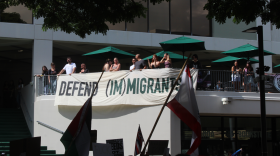Hundreds of academic researchers are investigating important problems impacting communities across the state. But sometimes those researchers don’t engage the local community — and that’s a problem, says a group of university researchers who have published a guidebook on the topic.
University of Hawaiʻi Oceanography Professor Rosie Alegado says place-based research in Hawaiʻi has often been a one-way street. An academic comes in, extracts community knowledge, and that community never hears from them again.
She says researchers need to engage the community.
"When that doesn’t happen, even though the intentions are great, even though the potential research has a lot of positive benefits, the failure to engage communities and to work with a community, rather than on a community, rather than for a community, that really matters," Alegado said.
Alegado is part of a working group of university researchers and community stewardship organizations who have developed a set of best practices called Kūlana Noiʻi, or “standards of research.”

Since the initial publication of Kūlana Noiʻi in 2017, more than 600 researchers and community members have trained in the ideas, values, and behaviors laid out in the guidebook. So far, Alegado says, the groups have come up with eight kūlana or standards with two basic themes.
"So one is building and nurturing pilina. So what are the initial things you need to do to build that relationship? You know when you're coming into a place, you need to know the history, the people, and the place," Alegado said. "We need to respect that through understanding and acknowledging and honoring the local culture and traditions and knowledge and wisdom.
The second theme is a new one, which prompted the publication this year of Kūlana Noiʻi 2.0 — it has to do with knowledge stewardship.
"And that's really the understanding that as part of kuleana of local people to their place and to their ancestor and to their descendants, it's really important for communities to have access to and be able to utilize the information, the data," she said.
Alegado says it is not the group’s intention to provide a standard checklist for researchers, but rather start a deeper conversation on how academia can build more just and generative relationships with the communities they research.
Read the full Kūlana Noiʻi 2.0 below or click here to open a new tab.




